

PopEntertainment.com
> Feature
Interviews - Actors
> Feature Interviews P to T > Michael Rapaport
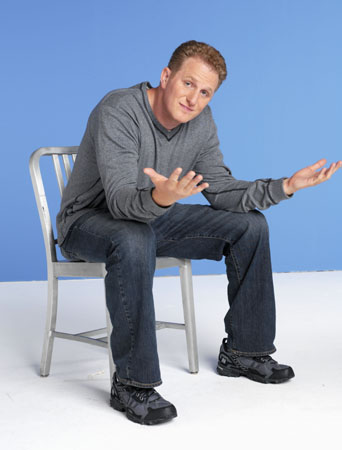 MICHAEL
RAPAPORT
MICHAEL
RAPAPORT
THE WAR ON TELEVISION
by JAY S. JACOBS
Copyright ©2005
PopEntertainment.com. All rights reserved.
Posted:
September 10, 2005.
Michael
Rapaport is one of the best color guys in show business. It's rare
that he gets the lead role, but when a director needs a legitimate, colorful,
smart working-class guy for the second or third role, they dial up Rapaport. He has been the
punch-drunk boxer who dates Mira Sorvino in Woody Allen's Mighty
Aphrodite, controversial teacher Danny Hanson on Boston Public,
Will Smith's best friend in Hitch, a screwed up college recruit in
Higher Learning, Schwarzenneger's sidekick in The 6th Day,
a green rookie in Cop Land, and dozens of other roles.
Now
Rapaport is trading in his supporting status and stepping front and center
on the new Fox sitcom The War at Home. Rapaport plays Dave, a
father in his late thirties who must try to deal with the new realities of
family life in an amped-up modern world. Handed the plum Sunday timeslot
between The Simpsons and Family Guy, the show is fast-tracked
by the net to be a new smash. A few days before the series is set to
debut, Rapaport spoke with us about his career and his new project.
How did you first get involved in acting?
I was
a stand-up comic. I started out in stand-up comedy. That got me more into
acting. Then I stopped doing stand-up comedy and continued acting.
Youíve worked with some of the great directors and writers in show business
Ė Woody Allen, Spike Lee, Richard Price, Quentin Tarantino,
David E. Kelley Ė does it ever amaze you that you are getting to work
with such talented people?
Yeah,
Iím always very impressed and humbled that Iíve been able to work with the
kind of people that Iíve been able to work with. But, when Iím working
with them I leave the fan at home. I come to work as a professional.
I think if you go into something looking at people as better than you, if
you give people too much respect, I donít think it benefits you or them.
Itís like when youíre playing basketball; when youíre a rookie, you have to
play the veterans as hard as you could, even thou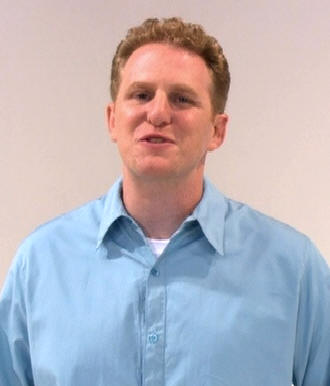 gh
you may have grown up watching them. When you play them,
you have to as hard as you would anybody else.
gh
you may have grown up watching them. When you play them,
you have to as hard as you would anybody else.
Your first movie,
Zebrahead became a real cult film. Were you surprised at the time by the
reaction?
Yeah. At the time I was surprised by anything. It was all so new to me. I
didnít know anything about Sundance Film Festival or that kind of thing. So
the whole thing was just a big surprise, because I really didnít know what I
was getting myself into.
Two of my favorite movies that you were in both came out in 1995 -- Mighty Aphrodite and the criminally overlooked
Kiss of Death. What were those films like to work on?
They
were great experiences. Obviously, working with Woody was a great
experience. I was fortunate to be able to work with him again on Small
Time Crooks. But at the time it was very exciting and a lot of fun. It
was a great opportunity. I learned a lot from him.
After
working in film for so many years, how did you get involved in Boston Public?
I
just got approached by David Kelley about doing the part. I read the
scripts and liked it. I took the opportunity. I felt it was the
best thing to do. It was the best opportunity,
to be on that kind of show and the character was really good. The
character had a lot of colors and I really enjoyed
doing it. That kind of kicked me off as far as maybe doing something else,
which turned into The War at Home.
Even on Boston
Public, like the films, you filmed on a closed set. I believe The
War at Home is the first time you have filmed in front of a live
audience. How is that different for you?
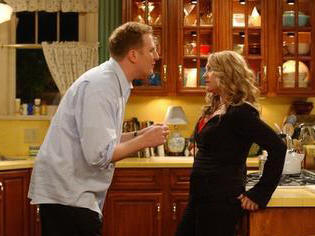 You
get a lot of energy from the audience. Also, the audience will dictate
whatís funny and whatís not funny. Sometimes things that you think are
funny, they might not fly in front
of the audience. Sometimes things that you would have never even
thought would be funny [get a huge reaction], which is obviously the more
positive result. Itís a great thing because all week youíre
rehearsing, rehearsing, rehearsing, and when you get in front of that live
audience to perform; the energy that you get when they receive you well is
like nothing else. Itís so much fun. Itís very electric.
You
get a lot of energy from the audience. Also, the audience will dictate
whatís funny and whatís not funny. Sometimes things that you think are
funny, they might not fly in front
of the audience. Sometimes things that you would have never even
thought would be funny [get a huge reaction], which is obviously the more
positive result. Itís a great thing because all week youíre
rehearsing, rehearsing, rehearsing, and when you get in front of that live
audience to perform; the energy that you get when they receive you well is
like nothing else. Itís so much fun. Itís very electric.
What attracted you to
The War at Home?
I
just loved the writing. I love the honesty of the writing. I love the
style of humor. Itís really interesting to me. I like that itís sort of
offsetting; it keeps you off balance. You never really know whatís going to
come out of their mouths. I really like that. I like that the show has
heart. Itís not about a family that doesnít want to be together and a
couple that doesnít want to be together. Theyíve been together for a long
time. Theyíre in it for the long haul. They love their kids. Although,
they make comments about it, I think that the character, Dave, would have it
no other way. Heíd be nothing without his wife and his kids.
Why is it that people of our generation have so much harder a time with
being parents?
I
think just the opportunities to go out and do things, the Internet and
traveling and all that kind of thing. I think that the family has taken a
back seat to people living their lives and thinking theyíre young. They say
forty is the new thirty. Thirty was kind of the time when you became an
adult not so long ago. Now theyíre saying forty is the new time when you
become an adult. Itís just a different time. Itís evolution.
In
a lot of ways, the pilot sort of reminded me of
Married: With Children,
in that the parents really arenít sure what they are doing with the kids and
there are no group hugs and lessons learned. In fact you often wonder if
this family really likes each other, but you know they do love each other.
Itís a hard juggling act for an actor to pull off. How is the cast to work
with?
The
rest of the cast is good. Anita Barone plays my wife. Sheís a lot of fun to
work with. I have a lot of respect for her. Weíve both been very
supportive of each other, so thatís a good environment. The kids are great,
Kyle (Sullivan), Dean (Collins) and Kaylee (DeFer); theyíre just a lot of
fun. Theyíre all very talented. Theyíre young, but theyíre all very
professional. Theyíve been working for a long time. Theyíre just
interesting young people who I enjoy being around.
Speaking of interesting young people, there is Kyleís character. I donít
know about you, but when I was a kid Iíd have done anything to not have my
parents think I was gay. Why do you think your son in the show would prefer
to be thought of as gay than to get grounded for borrowing the car without
permission?
I
think itís just an interesting quirk in the character. Itís just a
different take on things. Some of that may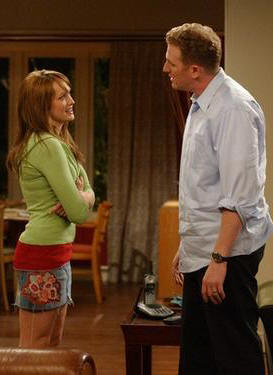 have come from (writer) Rob Lottersteinís personal life, personal experiences and all that sort of
thing. Itís just a different way to tell a story. A different angle to
approach things.
have come from (writer) Rob Lottersteinís personal life, personal experiences and all that sort of
thing. Itís just a different way to tell a story. A different angle to
approach things.
Not that Iím complaining or anything, but have you noticed that they never
do a sitcom where a father has an unattractive teenaged daughter?
RightÖ
Why do you think itís so interesting to have a father trying to keep his
beautiful daughter pure?
True. I donít know, I think itís a theme that everyÖ Itís kind of like a
fantasy kind of thing. Every parentsí worst nightmare is to have a sixteen
year-old daughter who is beautiful and sort of discovering her sexuality. I
think it plays for good conflict.
Are you afraid youíll become known as the guy who called Mary Tyler Moore a
bitch on TV (in a joke in the pilot episode)?
Nah,
I didnít even think about that. That might happen, but I think thatÖ I
really believe in the show, so whatever people take to. I feel that the
show is quotable, in the early stages. There are so many interesting things
being said by the characters. The different points of view are so
interesting. I think that people are going to dig it. Hopefully, theyíll
take it with a little grain of salt and wonít look too far into it.
Well, Iíve only seen the pilot so far, what can we expect from the show in
the future?
Thereís a whole thing about sex stuff on the internet. My character gets
caught playing around on the internet, doing some bad things. Kyle, the
would-be gay son, that whole thing kind of plays itself out. There are
definitely things dealing with race and Daveís discomfort with his daughter
dating a black kid. Meeting his family, thatís a very funny episode. We
did one that deals with a missing stash of marijuana in the house. That was
a lot of fun.
You got a really good timeslot, after
The Simpsons on Sunday
nights, so Fox must believe in you.
Yeah. I think they do.
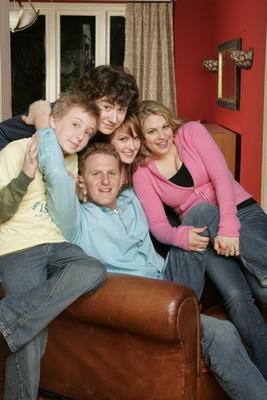 With so much tragedy going on in the world, like the Gulf Coast floods which happened recently, how do you think a comedy like yours
can help people?
With so much tragedy going on in the world, like the Gulf Coast floods which happened recently, how do you think a comedy like yours
can help people?
I
think that the comedies are just for that. They are to give people laughs.
For entertainment. Sometimes they can spur dialogue. The thing that I
think The War at Home does is that I think it will make people talk.
Although itís not Sixty Minutes, weíre not trying to reinvent the
wheel. Itís not a very, very serious show, but I think the weighty issues
are dealt with. We can promote dialogue. Other than that, itís just about
entertaining and making people laugh.
While doing
Boston Public, you also continued to make films on the side. Now that
you are the lead character of a series, which is such hard, time-consuming
work, do you plan to continue taking movie roles or are you going to
concentrate on the series?
Yeah. Yeah. Yeah. Iím looking forward to doing some stuff when Iím not
working, and even maybe squeezing something in while Iím doing the show.
Movies will always be a part of my life. Theyíll always be something Iíll
do, as long as I continue to get the opportunities. Iíve been doing this a
long time. Iíve made like 40-something movies and movies arenít going to go
anywhere. At this time, I need to try something different and try something
new and refreshing, where I get to sort of stand in the front.
Yeah, I noticed on your filmography that youíve done 55 movie and TV roles
in less than 15 years. Thatís pretty amazing. Whatís it like working so
much?
Itís
been a real whirlwind, but Iíve been able to learn a tremendous amount of
stuff from a lot of great people, a lot of great experiences. Iím really
fortunate to have done all that stuff. Iím looking forward to continuing to
do the show and other new stuff that will come my way.
Ideally, how would you like for people to look back on your career?
Look
at somebody who gave his all when he was in front to the camera. Someone
who tried to depict people in an honest way. Someone who had a little bit
of versatility. And someone who maintained his integrity throughout his
career.
Are there any misconceptions youíd like to clear up?
Yeah. Sometimes people think Iím dumber than I am because of the characters
that I play. But it takes a genius to play a fool.
Email
us Let us know what you
think.
Features
Return to the features page
